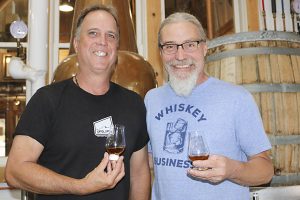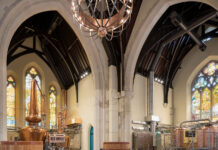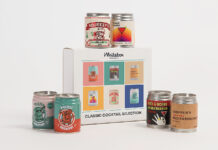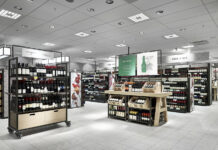
A “little” brewery by the name of Oskar Blues brought Craig Engelhorn and Wayne Anderson together. Meeting and working there in the late 1990s/early 2000s, their distillery idea cooked for years before they opened Spirit Hound Distillers in Lyon, Colorado, in 2012 with other business partners. Producing gin, coffee liqueur, rum, white dog and sambuca-style anise liqueur, they began aging straight malt whiskey, settling in for the long haul.
Then in September 2013, Spirit Hound was hit by one of the worst floods in Colorado history. Water flooded their facility and marked their barrels. Their staff and community pulled together, allowing them to bounce back stronger than ever post-flood. Everything from their straight malt whiskey to their sambuca and gin has won local and international awards, while their spirits are currently available in Colorado, Nebraska, Kansas and Texas.
Wayne oversees business development and Craig is head distiller. Here, in their own words, they fill us in on what led them to distilling, their distilling process and advice on growing a spirit brand.
Tell us a bit about your background.
Craig: I’m a small-town kid from northeast Nebraska. From a very early age I was interested in science and engineering (apparently, I fixed my mom’s vacuum when I was 3 years old) and was fortunate to have a few excellent teachers and mentors in my youth. After gaining my electrical engineering degree, I was lucky enough to land my dream job with AT&T Bell Laboratories — you know, where the transistor was invented and cosmic background radiation was discovered!
A rewarding career ended with a buyout at age 36 and a move from Illinois to Colorado, where I met Dale Katechis, owner of a new Lyons restaurant called Oskar Blues. As a homebrewer, I set about teasing Dale that his new restaurant should have a brewery. After all, it was the ’90s and we were in Colorado. Dale purchased equipment from the Santa Clarita Brewing Company and I set it up in the basement of Oskar Blues in Lyons, where I brewed Oskar Blues beer from 1998 to 2002.
Wayne: Born in Charlotte, NC, raised in West Central Georgia, I graduated from the University of Alabama in 1988. [I am the] father of five: four boys and one princess. My wife Debbie and I still have two kids in school. We live in Lyons.
During my years at Alabama, I was able to participate in a semester-long Outward Bound program based out of Leadville, CO. That experience definitely impacted me in a very positive manner. It not only was an amazing outdoor experience but it also helped kick me in the butt to set and reach some goals.
After graduation, I worked for Outward Bound for awhile with adjudicated youth in Florida and at an Outward Bound center in Scotland. On returning from a bohemian, 18-month bicycle tour of Europe, I decided I wanted to build on my Outward Bound journey as an educator. The only schools offering any kind of graduate degree in this type of experiential education at the time was CU [University of Colorado] in Boulder, so to Boulder we came. I ultimately figured out that it’s hard to raise kids on a teacher’s salary so I never finished the graduate degree but I also never left Colorado.
What led you to distilling and spirits?
Craig: While I was brewing beer at Oskar Blues, I figured it would be great to get a copper pot still and make a malt whiskey. Somewhere around the year 2000, I contacted the state of Colorado and had a conversation about the fact that our little brewpub would really like to distill spirits.
In those days, there were no DSPs in Colorado, and I suppose there’s a chance that Oskar Blues could have beat Stranahan’s to the punch. But I was so busy brewing and, honestly, my conversation with the state and the federal regulations sucked all the fun out of the whole idea. Fast-forward through a few years of woodworking, kitchen and bathroom remodeling, plus vintage auto restoration, to my friend and business partner, Wayne Anderson, suggesting we start a new brewery. I said distillery, and here we are.
Wayne: I think in many ways that the beverage industry chose me… I moved my family to Lyons in 1996 and was fairly comfortable working in sales with an internet start-up out of Boulder. With the boom and bust of the internet in those days, I probably should have stuck where I was, but the green grass of a new opportunity lured me into a company that ultimately did not make it. So in 2001 I found myself, for the first time since I was a kid, out of work with a family to support.
Oskar Blues Grill and Brew had opened in Lyons in 1997… and I got to know everyone there, including the person who would become my eventual partner at Spirit Hound, Craig Engelhorn. The owner of Oskar Blues was my neighbor and I jokingly said, “You may have to hire me to wash dishes or something.” Within a few days I found myself for the first time managing a restaurant. I should say I was one of the managers and on the low end of the totem pole… Lyons is a very seasonal town for restaurants with a small year-round population but a booming tourist and music scene in the summer. Oskar Blues would staff up hard for the summer and then have to lay people off in the winter.
The idea to start canning beer was very novel at the time… Heading into the winter, Dale came to me and… said he thought he could get our beer into cans but somebody needed to sell it. Well, I loved our beer, I loved Oskar Blues and nobody else in the country was doing it. Sounds crazy? I’ll do it! I learned the ins-and-outs of the beverage industry, on premise and off premise, from the seat of a 15-foot refrigerated box truck driving all over the state of Colorado.
By the time I left OB in 2009, I had a pretty good working knowledge of how the beverage industry works and how to get products to market. Around 2009, Craig and I knew we wanted to work together again and we kicked around several different business ideas over the years, none of them seemed just right. My role in getting the distillery going was mostly as an enabler of Craig. In fact, I may adopt that title on my next business card: Craig’s Enabler.
At one point I suggested a new brewery to accompany the restaurant that my wife and I had opened. Craig said we could certainly do another brewery for the restaurant, but what he had always really wanted to do was to make his own single malt whiskey… I could see that craft distilling was going to come right on the heels of craft beer and I had the know-how to get to market… We ultimately brought in a couple of partners, secured our building in Lyons and started distilling in 2012.
What spirits do you consider your flagship spirits?
Craig: With my brewing background at Oskar Blues, an all-malt whiskey seemed like a natural approach. First, I like Scotch, and second (no offense to the bourbon world), corn doesn’t make a particularly tasty beer. Seemed to me that a 100% malt whiskey would benefit from the range of flavors that malted barley brings to the party. We use Colorado Malting Company malt, so our whiskey is 100% Colorado, from grain to glass. Our whiskey has done well critically from the start. Our third barrel ever produced earned a 93 rating and an excellent review from Jim Murray in his 2017 Whisky Bible. Furthermore, we are producing straight malt whiskey, two years minimum in full-size barrels.
Beyond that, our gin has also garnered a good amount of industry respect and is a very popular gin especially along the Front Range of Colorado. Speaking of “terroir” and our gin, we use Rocky Mountain juniper, picked locally by our very own customers. Bring me a “four-finger” bag of local Rocky Mountain juniper, and I’ll trade you a gin drink. The gin started as a necessary clear spirit (as many distillers do) to keep the cash flow rolling while we waited for our whiskey.
Wayne: Our straight malt whiskey is certainly our flagship product. We use a 100% Colorado-grown grain bill. Our single malt can best be described as a cross between an American malt whiskey and a Scotch.
As with a lot of start-up distilleries, we could not afford to simply wait on the whiskey but needed other forms of cash flow to keep us afloat. I would say we hit a home run with our new-American style gin. Our gin is very soft on the palate, with lots of wonderful flavors and incredible balance. We use all locally-sourced juniper in our recipe and have a deal with our locals that if they bring us juniper berries, we give them drinks or bottles depending on how much they bring in. We constantly have folks bringing in juniper from their yards and from their hikes around the valley.
In addition, we also ferment sugarcane and molasses to distill rum, then age the rum in our own used whiskey barrels. We’ve got some pretty tasty cordials as well, including a Colorado sambuca that is incredible.
Tell us about your distilling process:
Craig: We’ve built our own distillation equipment — most notably, a beautiful all-copper pot still to finish our whiskey. We take pride in solving our own problems and producing quality products using equipment we make ourselves.
Wayne: In addition to the amazing spirits that are coming out of this place, the thing I really enjoy bragging about the most is the fact that Craig and his partner in crime, Steve [Williams], in the distillery, design and fabricate most of our equipment and all of our stills. We are distilling on custom, one-of-a-kind stills designed and built by our team. We have a couple of pot stills and a couple of column stills. Our spirits still is a copper pot based on design elements from traditional Scottish pot stills. In my opinion, they are incredible works of art and make the most delicious spirits. We brew and ferment the malted barley, then run it through our stripping still, then run it again through the spirits still.
How does living in Colorado determine the style/focus of your business?
Craig: Colorado still has a bit of the Old West independent attitude. We like to do things our own way and I think that’s a part of why the “craft” and “local” approach is very successful here.
Wayne: I think the Colorado experience is a huge part of who we are. Colorado fosters a kind of unbridled spirit for people to create and do amazing things. There was certainly a bit of the frontier spirit in our decision-making in the beginning… As it turns out, aging whiskey at altitude and in this dry environment really enhances the process nicely. Also, Colorado is just a great place for people from all over the world to come visit. Our tasting room is on the path to Rocky Mountain National Park, so we get visitors from everywhere.
How have you grown your brand at bars and beyond?
Wayne: We adopted a “slow grow” mantra from the beginning… We didn’t need to be huge as much as [be] the real deal. We figured the reputation would drive the demand and allow us to grow in a sensible way. We’ve been fortunate to foster some really great relationships in many of the establishments that serve our spirits. I have found it is the personal relationships that really make a big difference all the way up and down, from the distributor to the person working on cocktail ideas, to the servers themselves. We try to get everyone who sells our products to come visit us in Lyons and a lot of them take us up on it.
What advice would you give to fellow distillers looking to get their spirits into bars?
Wayne: With this craft-distilling movement, it quickly became very much about the local. However, one thing that has recently become a common theme when I’m out visiting our accounts is that it is not enough to be local. There is a lot of local. What “they” say is they want the best spirits. Period. And, by the way, if it comes from a local supplier, that’s even better. For me, that’s brilliant because that is where we shine. I would encourage fellow craft distillers to be authentic and focus on the quality of their products. Don’t take shortcuts and the results will follow.








